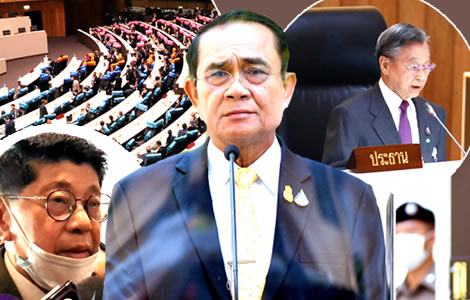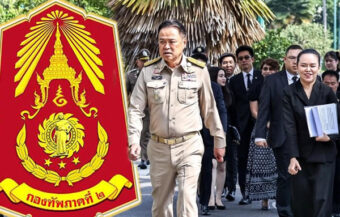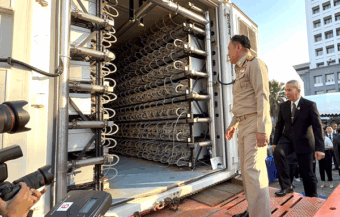A suggestion on March 17th last by Deputy Prime Minister Anutin Charnvirakul and leader of the Bhumjaithai Party that time would remove the controversial Section 272 provisions on Senate powers to elect a Prime Minister and government, has validity. What Thailand needs, perhaps above all else right now, is respect for the rule of law which may eventually lead to a stronger democracy.
Prime Minister Prayut Chan ocha was relaxed and in control this week. He appeared to be getting the upper hand, as moves both on the streets and in parliament to alter the constitution, appear to be stuttering despite what appeared to be an opposition victory in the assembly but which now looks like more of a masterstroke in the government’s favour.

Despite a defeat in parliament this week over an amendment to the referendum bill pushed by the opposition Pheu Thai party which successfully managed to insert a provision allowing the public to petition changes to the constitution, Prime Minister Prayut Chan ocha and his government appeared to end up in a stronger position.
The PM, in an ebullient and confident mood, challenged the opposition and the forces ranged against him. ‘If people are concerned that I will prolong my stay in power, they are free to proceed with charter amendments. They can choose between voting or not voting for me. I’m fine with it,’ he said.
Street protests are floundering with people turned off by violence and the chilling threat of prosecution
With the street protest movement floundering as the public has become disaffected by escalating violence and a new, more ruthless approach to police prosecutions leading to a chill factor impacting those leading the rallies and those taking part, the charter amendment process in parliament now also looks like it is going the government’s way and that arguably is, nowhere.
Opposition amendment upsets passage of the referendum bill last week pushed by the government
Last week, no less than 34 MPs from the government coalition parties and 77 senators voted for the Pheu Thai amendment to Section 9 of the bill to allow for a constitutional referendum which was one aspect of the constitutional amendment process being pushed through parliament by both the government and opposition parties at the beginning of March.
The referendum bill was sponsored by the government which has given rise to fears that, if it is defeated at a later third reading, the government may fall, triggering an election.
There has been some suggestion this week that the ruling Palang Pracharat Party may be preparing for such a scenario that would see a caretaker government remain in place but the government appears to be too comfortably fixed to entertain such a prospect.
Fears raised by an earlier bill voted down on March 17th over lawmaker’s fears after a court judgment
There is also speculation that the constitutionality of the bill still before parliament may also have to be tested by the Constitutional Court given fears raised by an earlier bill.
A bill to amend the 2017 constitution was voted down on Wednesday night, the 17th March, after the Constitutional Court had earlier sent a clear signal that it was unconstitutional leading many MPs and senators, in particular among government aligned parties, to avoid voting or abstaining when it came before the house.
Parliamentary vote on constitutional reform is questioned (Read here)
Even after this, the constitutional campaigner, Srisuwan Janya, the well known and fearless activist who has been at the centre of many significant political incidents in recent years and is Secretary-general of the Association for the Protection of the Constitution, threatened some 206 MPs and senators that voted in favour of the doomed bill that he would still take action against them by filing a report with the National Anti-Corruption Commission arguing that the parliamentarians had, by voting for the bill to progress, defied the ruling of the Constitutional Court.
This line of thinking was later roundly rejected by members of parliament and key legal advisors who say the public representatives acted out of conscience and a sense of duty with no ‘ill intent’ or prospect of gain to support such a complaint.
Referendum bill must be reviewed now by the Council of State, parliamentary session postponed for this
The latest position is that the Council of State, a key committee that advises the government on legal matters, has recommended that a special parliamentary session that was scheduled for April 7th and 8th be postponed as its members consider the wording of Section 9 of the bill before the house which may, it is reported, require further additional amendments as the opposition amendment, effectively, introduced a new mechanism by which a constitutional referendum may be initiated.
Deputy Prime Minister Wissanu Krea-ngam confirmed, this week, that he had spoken to the President of the Parliament Chuan Leekpaii who had agreed with him that the scheduled meeting was too early and it would be up to the government to call another session once the bill had been perfected.
Time has run out for a new constitution
Opposition lawmakers now accept that the possibility to run a referendum and go through the process of selecting a body to write a charter, have the charter reviewed and discussed and then sent back for another referendum is now an impossibility within the lifetime of the present government and parliament.
The 2017 constitution, drafted by a committee led by Mr Meechai Ruchupan and presented in 2016, was passed that year by a significant majority in a controversial referendum. The charter, quite deliberately, made it a difficult and tortuous process to change its provisions.
Radical new Thai constitution in the hands of the Thai people (Read our 2016 article here)
Opposition leaders are focused now on finding a way to amend certain sections of the 2017 charter but this may prove quite difficult as despite its defeat last week, the government appears, in reality, to be in control of the process.
Politics of moves to amend the 2017 constitution, Deputy Prime Minister Anutin says he now favours waiting for Section 272 provisions to expire
The focus has now shifted to the Democrat and Bhumjaithai Parties who campaigned on a platform of altering the constitution during the 2019 election.
In the last few weeks, Jurin Laksanawisit, the Minister of Commerce and Democrat Party leader, has recommitted his party to that cause but many Democrat MPs have failed to vote accordingly, particularly on March 17th last when the referendum bill was killed off from lack of support.
On March 17th, the Bhumjaithai Party walked out of the debate before a vote and since then, its leader, Deputy Prime Minister Anutin Charnvirakul has suggested that there is no need to alter the 2017 Constitution and in particular, Section 272, which gives the Senate a say in the vote for Prime Minister, as it expires five years after the installation of the first parliament in 2019 or the summer of 2024.
Public would vote to write a new constitution
A National Institute of Development Administration (NIDA) opinion poll, this month, showed 59% of the Thai public in favour of writing a new constitution with consistent polling against Section 272 since the protest movement began last year.
However, there may be merit in Mr Anutin’s suggestion as it can be argued that some law and even a bad law, is better than no law, some democracy is better than no democracy while with time and patience, this provision will expire.
Thailand has had far more constitutions than successful coups since 1932, maybe time to work with the law that’s in place to forge trust
Since it became a constitutional monarchy in 1932, Thailand has had no less than 20 constitutions. The country has had, in the same period, 21 coup attempts with 13 successful military heaves.
While many would rightly argue that the number of constitutions is linked to the number of coups, there may also be a corresponding relationship in reverse to those in opposition who insist on rewriting the constitution no matter what the rights and wrong are on either side.
Respect for the rule of law might be the winning formula now for the opposition to observe combined with a determination to make what democracy is there work more effectively with a focus on fighting elections, holding the government to account and even the possibility of developing parliamentary relationships across the aisles which can only ever happen when democracy is left to mature without upheaval.
Join the Thai News forum, follow Thai Examiner on Facebook here
Receive all our stories as they come out on Telegram here
Follow Thai Examiner here
Further reading:
Future Forward Party dissolved – leadership banned from politics by Constitutional Court order
Parliament to debate PM’s oath-taking question which is also referred to the Constitutional Court
Thailand seeks less rancour as it counts down to its first election under the new Constitution
Radical new Thai constitution now in the hands of the Thai people who vote in August
Rejection of draft constitution means extended military rule


















